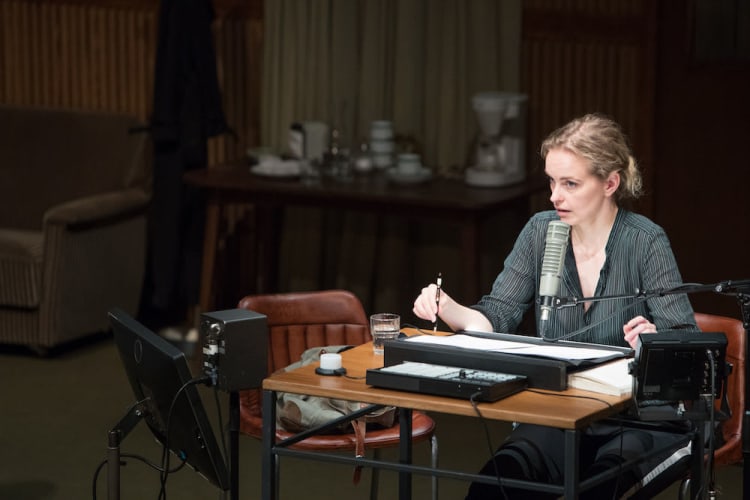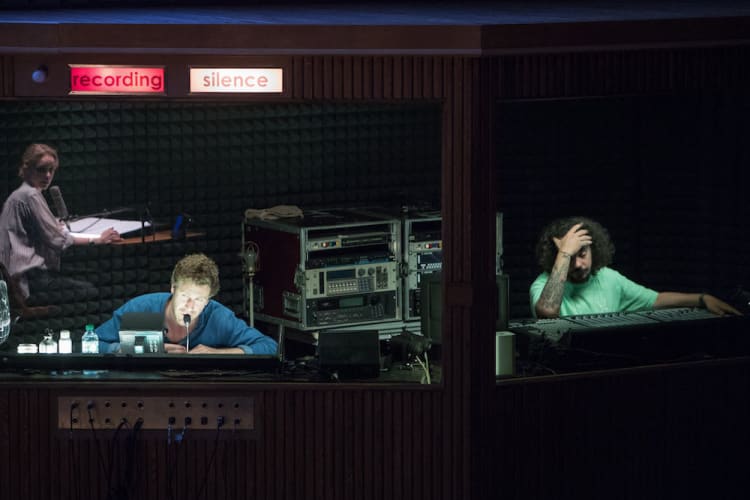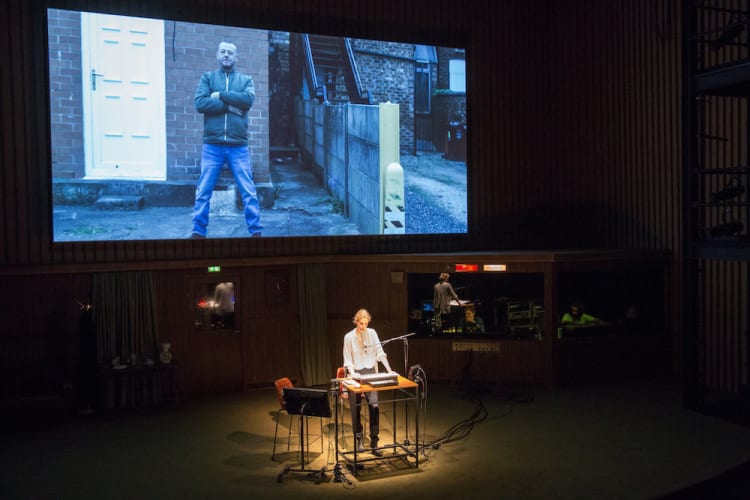Returning to Reims is, on one level, an adaptation of the memoir by Didier Eribon with the same name, but, like Complicite's The Encounter or Charlie Kaufman's screenplay for Adaptation, it adds extra layers onto the source material, making it a drama about adapting the original text.
Set in a recording studio, Nina Hoss plays an actress recording the voiceover for a documentary film adaptation of the book directed by Bush Moukarzel, with Ali Gadema as the recording engineer. After a bit of playful (and funny) banter between them, the film is projected onto a large screen behind Hoss while she speaks Eribon's words.
Eribon begins with his relationship with his father: a homophobe with a homosexual son. He tells us that it was only when his father had gone into a nursing home that he felt able to return to the family home. When his father died, he didn't go to the funeral as he didn't love him and had no desire to see his brothers again after thirty years, but he did go to see his mother the day after.
But then the boy who escaped a life of working class poverty for a world of education and art—where he found himself lying about the class he was from—then hit an existential crisis, coming to the conclusion that, despite what he had previously written about his estrangement, "it turned out to be much easier for me to write about shame linked to sexuality than about shame linked to class".
He then returns to his roots not just physically but also philosophically, reassessing his life, background and family in terms of class struggle in a brilliantly incisive way that triggers obvious parallels with modern politics across Europe and the US. He talks about how the left moved further to the right (of course Tony Blair's face appears on the film) and then lost the link with its core voters, who turned instead to the far right—he writes about the Front National, but of course we have the same issues.
There have been plenty of explanations and debates, especially since the Brexit vote, as the middle classes—including in the arts—have rushed to become more "inclusive" but often become more patronising instead. However one observation by Eribon particularly hit home: he observed that "we" has now come to mean "France" as opposed to "foreigners", whereas "we" used to mean "the workers" as opposed to "the bosses". The working classes have been persuaded to shift their blame onto fellow more vulnerable workers based on their nationality and away from their shared bosses.
Just as you start to wonder whether we could have simply watched the film and saved the actors' air fare, Hoss stops and begins to debate some of the cuts made by her director and the impact these have. This breaks away from the words on the page and the time it was set and puts it into a modern context without spelling it out. These discussions are largely light-hearted but do elaborate on and enhance the ideas in the book very effectively.
Finally, any pretence of realism breaks down as Gadema performs a rap while Moukarzel clearly acknowledges the presence of the theatre audience. When Hoss records the ending to the film, she expresses some dissatisfaction, then starts to speak about her own father—that is Hoss's real father, even though she has been referred to as "Katy" up to this point.
Willi Hoss was an activist who was a Communist Party member in Germany, a union activist who was the first to give representation to immigrant workers at Daimler-Benz, was a founder member of the German Green Party and an MP and then went to Brazil to help save the rainforest. His daughter speaks with pride and passion about him and even appears with him briefly in her Brazil film footage, supposedly shown on her phone.
Hoss has a magnetic stage presence and gives a flawlessly true-to-life, laid-back performance. Moukarzel's more upbeat style gives a nice contrast to hers for their discussions and fits well with the comic moments. Gadema's shy rapper adds a bit of comic relief from time to time.
This is a shamelessly political piece of theatre that argues its case thoroughly, but it does require some concentration to follow the arguments and Hoss's hypnotic commentary for two interval-less hours. I was gripped by the ideas, but it certainly isn't for everyone.


